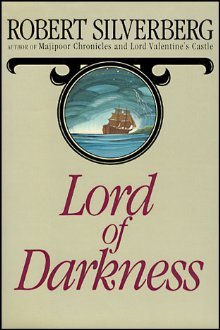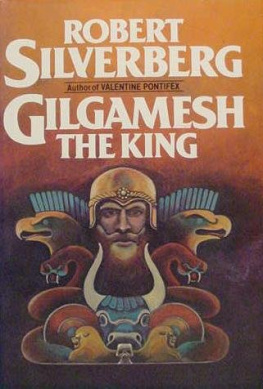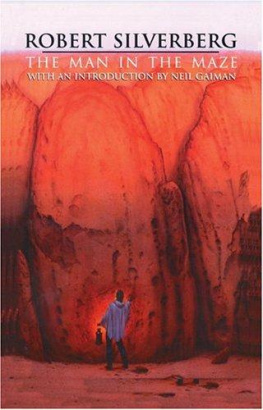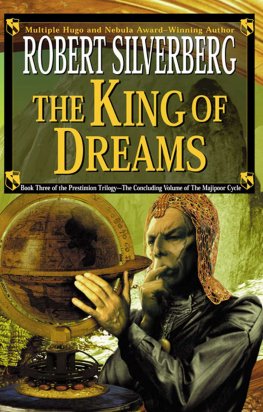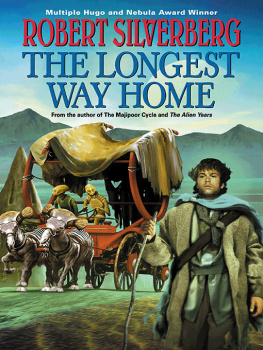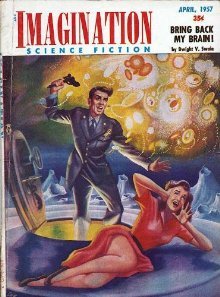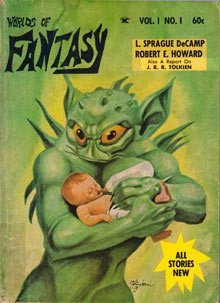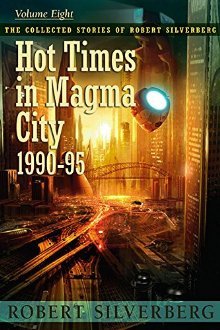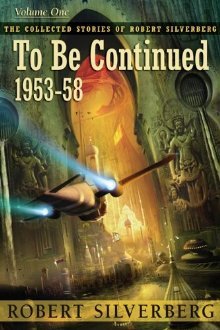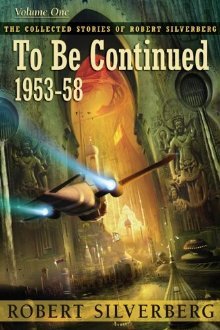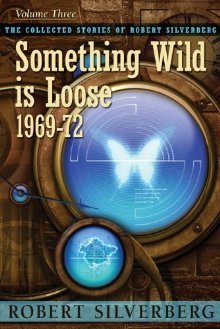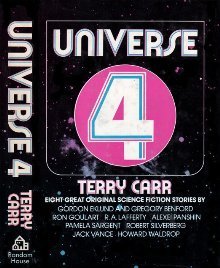Robert Silverberg - Breckenridge and the Continuum
Here you can read online Robert Silverberg - Breckenridge and the Continuum full text of the book (entire story) in english for free. Download pdf and epub, get meaning, cover and reviews about this ebook. year: 2009, publisher: Subterranean Press, genre: Science fiction. Description of the work, (preface) as well as reviews are available. Best literature library LitArk.com created for fans of good reading and offers a wide selection of genres:
Romance novel
Science fiction
Adventure
Detective
Science
History
Home and family
Prose
Art
Politics
Computer
Non-fiction
Religion
Business
Children
Humor
Choose a favorite category and find really read worthwhile books. Enjoy immersion in the world of imagination, feel the emotions of the characters or learn something new for yourself, make an fascinating discovery.
- Book:Breckenridge and the Continuum
- Author:
- Publisher:Subterranean Press
- Genre:
- Year:2009
- ISBN:978-1-59606-212-2
- Rating:5 / 5
- Favourites:Add to favourites
- Your mark:
- 100
- 1
- 2
- 3
- 4
- 5
Breckenridge and the Continuum: summary, description and annotation
We offer to read an annotation, description, summary or preface (depends on what the author of the book "Breckenridge and the Continuum" wrote himself). If you haven't found the necessary information about the book — write in the comments, we will try to find it.
Breckenridge and the Continuum — read online for free the complete book (whole text) full work
Below is the text of the book, divided by pages. System saving the place of the last page read, allows you to conveniently read the book "Breckenridge and the Continuum" online for free, without having to search again every time where you left off. Put a bookmark, and you can go to the page where you finished reading at any time.
Font size:
Interval:
Bookmark:
Breckenridge and the Continuum
by Robert Silverberg
Then Breckenridge said, I suppose I could tell you the story of Oedipus King of Thieves tonight.
The late afternoon sky was awful: gray, mottled, fierce. It resonated with a strange electricity. Breckenridge had never grown used to that sky. Day after day, as they crossed the desert, it transfixed him with the pain of incomprehensible loss.
Oedipus King of Thieves, Scarp murmured. Arios nodded. Horn looked toward the sky. Militor frowned. Oedipus, said Horn. King of Thieves, Arios said.
Breckenridge and his four companions were camped in a ruined pavilion in the deserta handsome place of granite pillars and black marble floors, constructed perhaps for some delicious paramour of some forgotten prince of the city-building folk. The pavilion lay only a short distance outside the walls of the great dead city that they would enter, at last, in the morning. Once, maybe, this place had been a summer resort, a place for sherbet and swimming, in that vanished time when this desert had bloomed and peacocks had strolled through fragrant gardens. A fantasy out of the Thousand and One Nights: long ago, long ago, thousands of years ago. How confusing it was for Breckenridge to remember that that mighty city, now withered by time, had been founded and had thrived and had perished all in an era far less ancient than his own. The bonds that bound the continuum had loosened. He flapped in the time-gales.
Tell your story, Militor said.
They were restless, eager; they nodded their heads, they shifted positions. Scarp added fuel to the campfire. The sun was dropping behind the bare low hills that marked the deserts western edge; the days smothering heat was suddenly rushing skyward, and a thin wind whistled through the colonnade of grooved gray pillars that surrounded the pavilion. Grains of pinkish sand danced in a steady stream across the floor of polished stone on which Breckenridge and those who traveled with him squatted. The lofty western wall of the nearby city was already sleeved in shadow.
Breckenridge drew his flimsy cloak closer around himself. He stared in turn at each of the four hooded figures facing him. He pressed his fingers against the cold smooth stone to anchor himself. In a low droning voice he said This Oedipus was monarch of the land of Thieves, and a bold and turbulent man. He conceived an illicit desire for Eurydice his mother. Forcing his passions upon her, he grew so violent that in their coupling she lost her life. Stricken with guilt and fearing that her kinsmen would exact reprisals, Oedipus escaped his kingdom through the air, having fashioned wings for himself under the guidance of the magician Prospero; but he flew too high and came within the ambit of the chariot of his father Apollo, god of the sun. Wrathful over this intrusion, Apollo engulfed Oedipus in heat, and the wax binding the feathers of his wings was melted. For a full day and a night Oedipus tumbled downward across the heavens, plummeting finally into the ocean, sinking through the seas floor into the dark world below. There he dwells for all eternity, blind and lame, but each spring he reappears among men, and as he limps across the fields green grasses spring up in his tracks.
There was silence. Darkness was overtaking the sky. The four rounded fragments of the shattered old moon emerged and commenced their elegant, baffling saraband, spinning slowly, soaking one another in shifting patterns of cool white light. In the north the glittering violet and green bands of the aurora flickered with terrible abruptness, like the streaky glow of some monstrous searchlight. Breckenridge felt himself penetrated by gaudy ions, roasting him to the core. He waited, trembling.
Is that all? Militor said eventually. Is that how it ends?
Theres no more to the story, Breckenridge replied. Are you disappointed?
The meaning is obscure. Why the incest? Why did he fly too high? Why was his father angry? Why does Oedipus reappear every spring? None of it makes sense. Am I too shallow to comprehend the relationships? I dont believe that I am.
Oh, its old stuff, said Scarp. The tale of the eternal return. The dead king bringing the new years fertility. Surely you recognize it, Militor. The aurora flashed with redoubled frenzy, a coded beacon, crying out, SPACE AND TIME, SPACE AND TIME, SPACE AND TIME. You should have been able to follow the outline of the story, Scarp said. Weve heard it a thousand times in a thousand forms.
SPACE AND TIME
Indeed we have, Militor said. But the components of any satisfying tale have to have some logical necessity of sequence, some essential connection.SPACEWhat weve just heard is a mass of random floating fragments. I see the semblance of myth but not the inner truth.
TIME
A myth holds truth, Scarp insisted, no matter how garbled its form, no matter how many irrelevant interpolations have entered it. The interpolations may even be one species of truth, and not the lowest species at that.
The Dow Jones Industrial Average, Breckenridge thought, closed today at 1100432.86
At any rate, he told it poorly, Arios observed. No drama, no intensity, merely a bald outline of events. Ive heard better from you on other nights, Breckenridge. Scheherazade and the Forty Giantsnow, that was a story! Don Quixote and the Fountain of Youth, yes! But thisthis
Scarp shook his head. The strength of a myth lies in its content, not in the melody of its telling. I sense the inherent power of tonights tale. I find it acceptable.
Thank you, Breckenridge said quietly. He threw sour glares at Militor and Arios. It was hateful when they quibbled over the stories he told them. What gift did he have for these four strange beings, anyhow, except his stories? When they received that gift with poor grace they were denying him his sole claim to their fellowship.
A million years from nowhere
SPACETIME
ApolloJesusApollo
The wind grew chillier. No one spoke. Beasts howled on the desert. Breckenridge lay back, feeling an ache in his shoulders, and wriggled against the cold stone floor.
Merry my wife, Cassandra my daughter, Noel my son
SPACETIME
SPACE
His eyes hurt from the auroras frosty glow. He felt himself stretched across the cosmos, torn between then and now, breaking, breaking, ripping into fragments like the moon
The stars had come out. He contemplated the early constellations. They were unfamiliar; no matter how often Scarp or Horn pointed out the patterns to him, he saw only random sprinklings of light. In his other life he had been able to identify at least the more conspicuous constellations, but they did not seem to be here. How long does it take to effect a complete redistribution of the heavens? A million years? Ten million? Thank God Mars and Jupiter still were visible, the orange dot and the brilliant white one, to tell him that this place was his own world, his own solar system. Images danced in his aching skull. He saw everything double, suddenly. There was Pegasus, there was Orion, there was Sagittarius. An overlay, a mass of realities superimposed on realities.
Listen to this music, Horn said after a long while, producing a fragile device of wheels and spindles from beneath his cloak.
He caressed it and delicate sounds came forth: crystalline, comforting, the music of dreams, sliding into the range of audibility with no perceptible instant of attack. Shortly Scarp began a wordless song, and one by one the others joined himfirst Horn, then Militor, and lastly, in a dry, buzzing monotone, Arios.
What are you singing? Breckenridge asked.
The hymn of Oedipus King of Thieves, Scarp told him
Had it been such a bad life? He had been healthy, prosperous, and beloved. His father was managing partner of Falkner, Breckenridge & Company, one of the most stable of the Wall Street houses, and Breckenridge, after coming up through the ranks in the family tradition, putting in his time as a customers man and his time in the bond department and his time as a floor trader, was a partner too, only ten years out of Dartmouth. What was wrong with that? His draw in 1972 was $83,500not as much as he had hoped for out of a partnership, but not bad, not bad at all, and next year might be much better. He had a wife and two children, an apartment on East 73rd Street, a country cabin on Candlewood Lake, a fair-size schooner that he kept in the Gulf Coast marina, and a handsome young mistress in an apartment of her own on the Upper West Side. What was wrong with that? When he burst through the fabric of the continuum and found himself in an unimaginably altered world at the end of time, he was astonished not that such a thing might happen but that it had happened to someone as settled and well established as himself.
Font size:
Interval:
Bookmark:
Similar books «Breckenridge and the Continuum»
Look at similar books to Breckenridge and the Continuum. We have selected literature similar in name and meaning in the hope of providing readers with more options to find new, interesting, not yet read works.
Discussion, reviews of the book Breckenridge and the Continuum and just readers' own opinions. Leave your comments, write what you think about the work, its meaning or the main characters. Specify what exactly you liked and what you didn't like, and why you think so.


